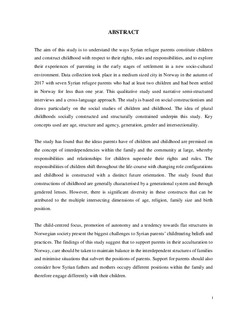| dc.description.abstract | The aim of this study is to understand the ways Syrian refugee parents constitute children and construct childhood with respect to their rights, roles and responsibilities, and to explore their experiences of parenting in the early stages of settlement in a new socio-cultural environment. Data collection took place in a medium sized city in Norway in the autumn of 2017 with seven Syrian refugee parents who had at least two children and had been settled in Norway for less than one year. This qualitative study used narrative semi-structured interviews and a cross-language approach. The study is based on social constructionism and draws particularly on the social studies of children and childhood. The idea of plural childhoods socially constructed and structurally constrained underpin this study. Key concepts used are age, structure and agency, generation, gender and intersectionality.
The study has found that the ideas parents have of children and childhood are premised on the concept of interdependencies within the family and the community at large, whereby responsibilities and relationships for children supersede their rights and rules. The responsibilities of children shift throughout the life-course with changing role configurations and childhood is constructed with a distinct future orientation. The study found that constructions of childhood are generally characterised by a generational system and through gendered lenses. However, there is significant diversity in these constructs that can be attributed to the multiple intersecting dimensions of age, religion, family size and birth position.
The child-centred focus, promotion of autonomy and a tendency towards flat structures in Norwegian society present the biggest challenges to Syrian parents’ childrearing beliefs and practices. The findings of this study suggest that to support parents in their acculturation to Norway, care should be taken to maintain balance in the interdependent structures of families and minimise situations that subvert the positions of parents. Support for parents should also consider how Syrian fathers and mothers occupy different positions within the family and therefore engage differently with their children. | nb_NO |
